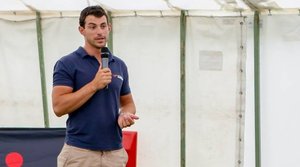How do you get faster at endurance races without any training?
In this article, Coach Philip explores how athletes are often distracted by the enormity of the task and get excited about the headline sessions instead of ensuring that all the fundamentals are in place to improve their chances of success or, more importantly, reduce the probability of failure.
It isn't the mountains ahead to climb that wear you out; it's the pebble in your shoe.
–Muhammad Ali
Having worked with many ultra-endurance athletes over the years, along with countless IRONMAN athletes, it becomes evident to us that an endurance athlete’s downfall is often not because of their lack of desire to get to the finish line or through a lack of fitness or experience instead, failure is often the result of avoidable, non-fitness related issues along their journey.
The problem is, discomfort is part of the allure of endurance training – the sports have it in the name: Endure: athletes need to endure to succeed, and the one who endures the best wins! Everyone lives the experience together, and there is a close-knit community! Therefore, putting up with miles of discomfort is a crucial measure of endurance performance! This skill is double-edged. If we take the quote by Muhammad Ali, the ability to climb mountains or put one foot in front of the other has both physical and mental components, even when the mountain is metaphorical. However, almost every endurance athlete we have ever met is fully aware of the acute pain a blister or chaffage can exert. We are all mindful of how our head quickly moves away from considering the fatigue in our head, legs, arms or shoulders and focuses only on the next step and the blinding pain from the blister or the next swing of the limb. We have all seen pretty gruesome photos of feet and limbs of what happens when we keep on going through that pain. It clearly takes exceptional mental fortitude to get through that. In reality, these ultimate showstoppers can be relatively easily avoided with good planning and quick reaction.
The same is so true when it comes to training and performance. Injuries happen due to overuse or an imbalance in your physical system. Often, athletes get very excited about the big miles or massive, challenging sessions and avoid the opportunity to work on some of their fundamental skills that would improve their efficiency or economy. In this instance, it isn’t the size of the session that will slow them down; instead, it is their ability to be efficient in the water, on the bike or running – they are leaking efficiency.
Here are some examples of metaphorical pebbles that athletes often overlook:
If you can’t lift your arms equally above your head into a streamlined position, it doesn’t matter how many miles you swim; you could be faster by working on your range of motion!
If you can’t stay in your aerobars or brake too much on the bike, it doesn’t matter what your FTP is if you can’t keep your speed up!
If you can’t stand on one leg without wobbling over, how much effort is going into stabilising you compared to propelling you forward?
Therefore, it is worth all athletes' time to focus on the fundamentals and the basics to ensure that they leave no stone unturned when it comes to getting rid of the pebbles from their shoes and ensuring they aren’t worn out unnecessarily with easily fixed problems requiring no extra training! After all, we can cope with a few footsteps with a pebble in our shoe, but much more than that, and we will start having problems.

Philip is the founder of Tri Training Harder LLP. He’s a British Triathlon Level 3 coach, and has been coaching for over a decade and is involved with mentoring and developing other coaches.
Philip has coached athletes to European and World AG wins, elite racing, many Kona qualifications, IRONMAN podiums and AG wins.
Alongside the conventional development through many CPD courses, he has also been fortunate enough to work alongside experts in the fields of Physiotherapy, Strength and Conditioning, Nutrition, Psychology, Biomechanics, Sports Medicine. Putting this knowledge into practice he has worked with thousands of athletes to various degrees, from training camps in Portugal and around Europe, clinics in the UK and online coaching.
Visit Philip's
Coach profile
We’re here to help
Tri Training Harder are one of the leading Triathlon coaching providers in the UK, using our wealth of experience to unite scientific and technological research with already well-established and successful best practices, to create a formula for triathlon and endurance coaching that works.
The result is an honest, dynamic, yet simple new way of constructing an athlete’s training to allow them to reach their potential.
If you’re planning your next season, just starting out in the sport or are looking for extra guidance at the very top end of the field, we are here to help, and our coaches would be delighted to hear from you. You can contact us via the website, and one of the team will be in touch.

